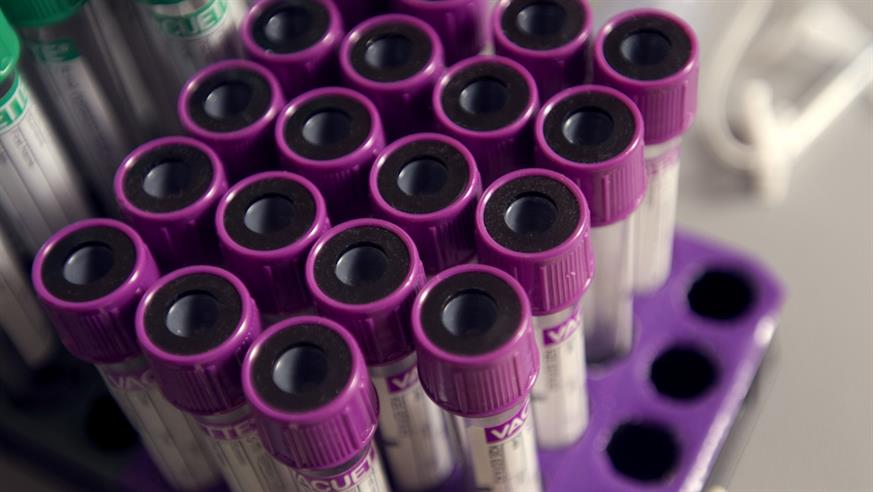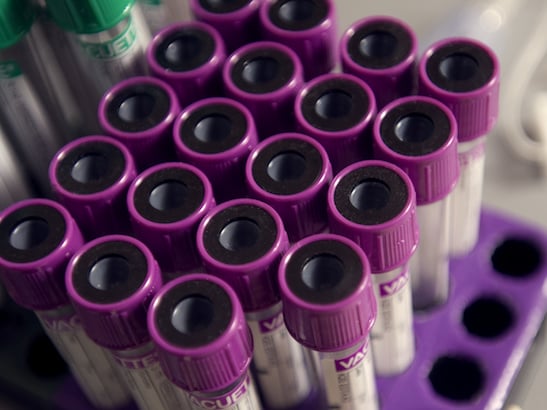
Blood samples. Public domain.
What if a blood test could show whether a cancer patient is responding to treatment, give early warning to tell doctors when a treatment stops working, and give valuable information about the next treatment to try?
This might sound like science fiction but tests like this, also known as liquid biopsies, are already being developed and tested in trials across the UK and internationally.
At a recent press briefing in central London, researchers from The Institute of Cancer Research, London told journalists about this rapidly progressing field of research.
“We are coming to the realisation that there are very many different types of cancer, and it may be that every patient’s cancer is subtly different depending on the genetic insults the cancer has suffered,” Professor Johann de Bono, Regius Professor of Cancer Research at the ICR and consultant oncologist at The Royal Marsden NHS Foundation Trust, told journalists.
“Every day millions of blood tests are carried out on cancer patients within the NHS, with improving technology this standard test could also give us a wealth of information about their cancer and its development.
“Knowing that cancer is very diverse, even within an individual patient, helps explain the challenge we face with effective treatment.
"I would liken it to a game of snooker — there may be many different coloured balls on the table. If we only get rid of the red balls we may find the cancer grows back from the blue or green balls. We need to see the whole picture and give the right treatments with this information in mind.”
Analysing DNA or whole cells in blood can give valuable information about cancer
Information can be harnessed from the blood in different ways. Fragments of cancer DNA found in the patient’s blood can give valuable information about the way the cancer is progressing. Whole cells can also be taken from the blood that can give large amounts of information about the cancer itself, or the patient’s immune response to the cancer.
Advances in technology have been the driving force to develop and implement these tests. Dr Suzanne Carreira works in the Cancer Biomarkers Group at the ICR. She described the changes she has seen: “I started doing this work about six years ago. Then we could look at 230 hotspot mutations in 19 genes in 14 patients at a time, the cost for processing a sample was around £280. Now we can get about a thousand times more information for the same price.”
This was a point that Professor de Bono echoed: “We have come so far in DNA sequencing technology, but computing power has also increased exponentially. We can get so much information from DNA, but we need computing of sufficient strength to tell us what is going on.”
Dr Carreira also pointed out: “As well as DNA from tumours, we can pick up the patient’s own normal DNA in the blood. Being able to analyse the DNA we were born with can tell us about mutations we inherited from our parents, like the BRCA breast cancer risk genes. Knowing about these genes may give clues to how cancers develop and what treatments may work best.”
‘Liquid biopsy’ tests can predict which patients will relapse
For some cancers, much of the preliminary research to show these tests work has been done already.
Dr Nick Turner leads the Molecular Oncology Team at the ICR. “These tests can predict which breast cancer patients will relapse after initial treatment," he said.
“One of our next steps is to show that having information from blood tests leads to better outcomes for breast cancer patients. In the next two months we will start recruiting 1,000 breast cancer patients for a new trial called plasmaMATCH. The trial will identify mutations in metastatic breast cancer of individual patients and try to match them to specific targeted treatments. It will take a couple of years to get results from this trial and others — but if they are positive we would expect to start seeing these tests introduced more widely in breast cancer.
“We may also be able to use these tests at an earlier stage for women whose cancer has not yet progressed. Of women given the standard treatment for breast cancer, 80% will be cured whereas 20% will relapse with incurable cancer. We showed in a research paper last year that we can use these tests to identify the women at risk of relapse by picking up residual cancer DNA in their blood. Using this test would help us target further treatment at those who would benefit.”
Some cancers are easier than others to track using the blood
Many cancers are amenable to liquid biopsies with particularly good progress having been made for lung, colorectal, breast and prostate cancer.
There are a few cancers that may prove more difficult, however. Glioblastoma is a type of brain tumour that is hidden from the blood supply by the blood-brain barrier and doesn’t shed much DNA into the bloodstream. If a patient had a relatively small number of cancerous cells far from a blood vessel this may also prove difficult to test.
These tests are likely to be used widely in future
A key question is when these tests will be used in standard practice.
As Prof de Bono described: “These blood tests are being used in many clinical trials, and if we see their usefulness then we would expect them to be used more broadly in the NHS in the next five years. The information we get from them can be more accurate than we get from a tissue biopsy they are less intrusive for the patient.
“These tests are relatively simple to perform, and they are likely to be cost effective. In fact they could save the NHS a lot of money as expensive cancer drugs could be reserved for when they are most likely to be effective.”
This field has moved incredibly quickly, and the next few years will be critical to their implementation more widely in cancer treatment. Watch this space for regular updates in the area as we publish new research.
